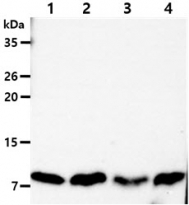ARG57056
anti-DYNLL1 / PIN antibody [13C9]
anti-DYNLL1 / PIN antibody [13C9] for Western blot and Human
Overview
| Product Description | Mouse Monoclonal antibody [13C9] recognizes DYNLL1 / PIN |
|---|---|
| Tested Reactivity | Hu |
| Tested Application | WB |
| Host | Mouse |
| Clonality | Monoclonal |
| Clone | 13C9 |
| Isotype | IgG2b, kappa |
| Target Name | DYNLL1 / PIN |
| Antigen Species | Human |
| Immunogen | Recombinant fragment corresponding to aa. 1-89 of Human DYNLL1 / PIN. |
| Conjugation | Un-conjugated |
| Alternate Names | LC8a; Dynein light chain 1, cytoplasmic; PIN; DNCLC1; Protein inhibitor of neuronal nitric oxide synthase; LC8; DLC8; 8 kDa dynein light chain; DLC1; DNCL1; Dynein light chain LC8-type 1; hdlc1 |
Application Instructions
| Application Suggestion |
|
||||
|---|---|---|---|---|---|
| Application Note | * The dilutions indicate recommended starting dilutions and the optimal dilutions or concentrations should be determined by the scientist. |
Properties
| Form | Liquid |
|---|---|
| Purification | Purification with Protein A. |
| Buffer | PBS (pH 7.4), 0.02% Sodium azide and 10% Glycerol. |
| Preservative | 0.02% Sodium azide |
| Stabilizer | 10% Glycerol |
| Concentration | 1 mg/ml |
| Storage Instruction | For continuous use, store undiluted antibody at 2-8°C for up to a week. For long-term storage, aliquot and store at -20°C. Storage in frost free freezers is not recommended. Avoid repeated freeze/thaw cycles. Suggest spin the vial prior to opening. The antibody solution should be gently mixed before use. |
| Note | For laboratory research only, not for drug, diagnostic or other use. |
Bioinformation
| Database Links | |
|---|---|
| Gene Symbol | DYNLL1 |
| Gene Full Name | dynein, light chain, LC8-type 1 |
| Background | Cytoplasmic dyneins are large enzyme complexes with a molecular mass of about 1,200 kD. They contain two force-producing heads formed primarily from dynein heavy chains, and stalks linking the heads to a basal domain, which contains a varying number of accessory intermediate chains. The complex is involved in intracellular transport and motility. The protein described in this record is a light chain and exists as part of this complex but also physically interacts with and inhibits the activity of neuronal nitric oxide synthase. Binding of this protein destabilizes the neuronal nitric oxide synthase dimer, a conformation necessary for activity, and it may regulate numerous biologic processes through its effects on nitric oxide synthase activity. Alternate transcriptional splice variants have been characterized. [provided by RefSeq, Jul 2008] |
| Function | Acts as one of several non-catalytic accessory components of the cytoplasmic dynein 1 complex that are thought to be involved in linking dynein to cargos and to adapter proteins that regulate dynein function. Cytoplasmic dynein 1 acts as a motor for the intracellular retrograde motility of vesicles and organelles along microtubules. May play a role in changing or maintaining the spatial distribution of cytoskeletal structures. Binds and inhibits the catalytic activity of neuronal nitric oxide synthase. Promotes transactivation functions of ESR1 and plays a role in the nuclear localization of ESR1. Regulates apoptotic activities of BCL2L11 by sequestering it to microtubules. Upon apoptotic stimuli the BCL2L11-DYNLL1 complex dissociates from cytoplasmic dynein and translocates to mitochondria and sequesters BCL2 thus neutralizing its antiapoptotic activity. [UniProt] |
| Calculated MW | 10 kDa |
| PTM | Phosphorylation at Ser-88 appears to control the dimer-monomer transition. According to PubMed:15193260, it is phosphorylated at Ser-88 by PAK1, however, according to PubMed:18650427, the DYNLL1 dimer is not accessible for PAK1 and the phosphorylation could not be demonstrated in vitro. |
Images (1) Click the Picture to Zoom In






